Photo of the Day: H20 Zone on Freedom of the Seas
In: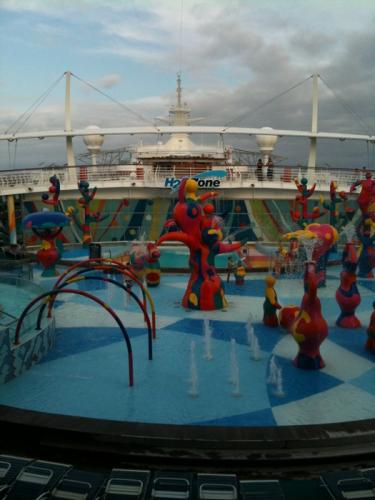
Photo by Carlos Fernandez

Photo by Carlos Fernandez
One of the major reasons to go on a cruise is your cruise ship brings you to a few ports of call in many different countries to visit. Royal Caribbean ships visit ports of call on continents around the world and it can be a very exciting experience. Getting off your cruise ship to visit a port is as much a part of your cruise as the onboard entertainment or the food served daily on your ship. Here are some guidelines for successful port touring.
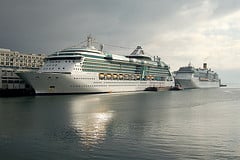 Before you ever set foot on your cruise ship, you should read about the ports of call you will be visiting and do some research into the port itself as well as what you're interested in doing. You don't want to be that family that gets off the ship and has the argument about what to do. Each port you visit has different options and it's hard to generalize any of them. There are ports that have a lot of beaches, some that are urban and others that are a mix of the two. It's your job to learn more about them before you get there.
Before you ever set foot on your cruise ship, you should read about the ports of call you will be visiting and do some research into the port itself as well as what you're interested in doing. You don't want to be that family that gets off the ship and has the argument about what to do. Each port you visit has different options and it's hard to generalize any of them. There are ports that have a lot of beaches, some that are urban and others that are a mix of the two. It's your job to learn more about them before you get there.
You will want to first learn about the port you're visiting. Before you know what you're going to do, you're going to need to know what the port is best known for. Think of it like going to a steak house restaurant and ordering the salad. Sure, you can do that but if you're going to a steak house, you should probably stick with what they are best known for...steaks! So if a port is best known for its beaches, you may want to focus on that. Likewise, if a port is known for its shopping or cultural heritage, you'd be best served sticking with that. It isn't to say you couldn't have a good time going shopping on an island best known for its beaches, but it's just a best practice.
Each ship disembarks differently, but you will go to the assigned deck that the gangway is located on (usually a low deck, like deck 2). Once at the gangway, generally speaking you will need your SeaPass card and it's smart to also bring photo identification. There are differing opinions on this, but I personally recommend bringing your passport with you to any port you visit. The reason for this recommendation is simple: if for some reason you get stuck on the island and miss the cruise ship, without a passport, it will be quite difficult to get back to your home country. However, if you have a passport, all you need is to buy transportation back home and your passport will easily get you back.
When disembarking on Royal Caribbean, you will swipe your SeaPass card at a kiosk where a Royal Caribbean crew member will confirm your identity. Think of this like checking out a book at the library, only this time, you're checking yourself out of the ship. Make a note of what time you need to return to the ship by (and ensure you are back well before that time).
There are two ways to get to the port and they are by a dock or by tenders. A dock is simple enough, the ship docks and you walk off the gangway to a dock and you walk right into the port. If your ship uses a tender, you will board small boats that will ferry you to the dock.
Docking is ideal because it makes for the easiest and most convenient means of getting to and from the ship. Tenders are slower and will require more time to fully load and unload each time and there is usually a good amount of waiting, especially during peak times.
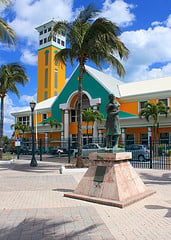 Navigating around the port
Navigating around the portEach port is different and offers different amenities to get you where you're going. If you have an excursion booked, often you will meet in a pre-arranged area near the port dock and there's usually a lot of signs to indicate where and when to meet. If you're doing something by yourself, some ports allow easy walking access to the area, while others may require taxis or rental cars to get around.
Having your research done in advance will assist in making the transition from ship to port as seamless as possible, as locals in many of the ports can be pushy with offering their services. Be sure to know what you want to do in advance so there's no confusion about what to do.
One last word about the ports and that's the people you will encounter a wide variety of locals in each port you visit. Some are pushy and some aren't. When we say "pushy", we mean there are varying degrees of sales pitches to you for their goods or services. Most often, a simple "no thank you" will suffice in ending their conversation, but some ports do have locals that will spend more time trying to convince you to spend your money. It's hard to generalize about any port or people, so do your research to know if the port you are visiting will have locals that can be more aggressive than others.
A Royal Caribbean passenger from Explorer of the Seas was arrested for possessing marijuana yesterday in Bermuda. Patrick Gallo, 27, of New York, pleaded guilty to charges of importing and possessing the drug.
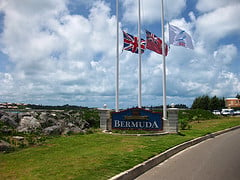 Authorities discovered the drug after security officers on the Explorer of the Seas were walking outside Gallo's cabin on Saturday when they smelt cannabis and decided to initiate a search. After searching the cabin, they found Gallo holding a partially burned hand-rolled cigarette. They also found a second partially smoked cigarette and another bag with plant like material. A total of 2.5 grams of cannabis were found in his cabin.
Authorities discovered the drug after security officers on the Explorer of the Seas were walking outside Gallo's cabin on Saturday when they smelt cannabis and decided to initiate a search. After searching the cabin, they found Gallo holding a partially burned hand-rolled cigarette. They also found a second partially smoked cigarette and another bag with plant like material. A total of 2.5 grams of cannabis were found in his cabin.
According to police, Gallo admitted it was his drugs. He was sentenced to pay a $1,500 fine.
Friend of the blog, Melissa DiCato of Possible Vacations has graciously taken some time to write this guest blog entry! Today, she looks at what Royal Caribbean is doing to keep things new and fresh across their fleet of ships. Take it away Melissa!
Royal Caribbean is doing all they can to ensure all of their clients’ needs are being well taken care of. Oasis of the Seas has been such a huge success for Royal, they are starting to take the ideas that were only implemented on Oasis of the Seas and place them on the rest of their fleet. Below you will find a breakdown of what you can soon find onboard Royal Caribbean Ships.
Liberty & Freedom of Seas
Fleetwide
Family programming – Royal Babies & Royal Kids
Dinning
Suite Enhancements (Grand Suites & Higher)
If you are looking to take a Royal Caribbean Cruise, these enhancements will be sure to delight any family at sea. Every cruise ship will offer you something a little unique and different which is why people cruise time and time again. Most families enjoy taking cruises because they can just sit back and relax while everything around them is taken care of, including their most precious cargo…their children. Something to consider is taking a Royal Caribbean themed cruise such as Romance, Music, Cruise4Haiti amongst many others.
Thanks again to Melissa for her great blog entry. You can find Melissa on Twitter as well as on her own blog, Possible Vacations: Friends sharing travel stories.
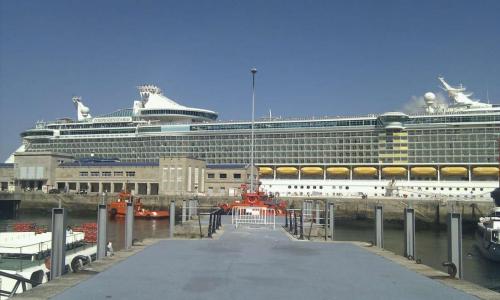
Photo by Iñigo Zendegi
If there's one cruise company that has placed the most resources in the idea that European cruise demand is what will drive profits, it's been Royal Caribbean. Over the past couple of years, Royal Caribbean has been moving more and more of their ships to Europe to meet the perceived demand for cruise ships as well as the strong Euro. Yesterday, cruise stock prices fell on the New York Stock Exchange on concerns about demand in Europe and on a drop in the broader stock market.
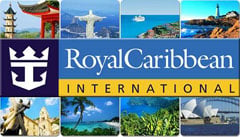 Royal Caribbean stock dropped 4.9 percent to $26.74 after trading on Wednesday and competitor cruise line stocks followed as well. The reason for the drop in price was a day earlier, Europe's biggest travel company, TUI Travel, said strong booking patterns seen in early May were not sustained during the early summer period.
Royal Caribbean stock dropped 4.9 percent to $26.74 after trading on Wednesday and competitor cruise line stocks followed as well. The reason for the drop in price was a day earlier, Europe's biggest travel company, TUI Travel, said strong booking patterns seen in early May were not sustained during the early summer period.
"TUI Travel (Plc's) cautionary comments coupled (with) recent comments from European-based consumer staple companies of slowing demand cannot be dismissed and will bear ongoing close monitoring," Wells Fargo analyst Timothy Conder said in a research note Wednesday.
All isn't lost quite yet, as Wells Fargo Analyst Timothy Conder also said that booking and pricing trends for European-based cruises remained "encouraging."
Royal Caribbean has joined some other cruise lines in adopting policies to incorporate cage-free eggs into their dining operations. Royal Caribbean worked with the Humane Society of the United States when they created their new policy.
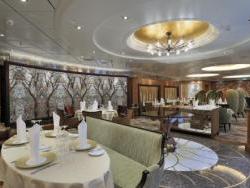 Royal Caribbean will go from 3.2 million eggs to cage-free immediately, and will increase to 6.8 million within one year. The Human Society estimates this change will spare nearly 30,000 hens each year from being crammed inside tiny cages.
Royal Caribbean will go from 3.2 million eggs to cage-free immediately, and will increase to 6.8 million within one year. The Human Society estimates this change will spare nearly 30,000 hens each year from being crammed inside tiny cages.
"Many vacationers take their concern for animals, food safety and sustainability with them when they travel, and we applaud Royal Caribbean and Carnival for taking those concerns seriously by reducing their reliance on eggs from caged hens," said Matthew Prescott, corporate outreach director of The HSUS' factory farming campaign.
Neil Clarridge of the Star-Tribune, a Virginia newspaper, chronicled his recent cruise aboard Freedom of the Seas. In part one of a three part series, Clarridge embarked on the cruise as a graduation gift for his oldest daughter. Clarridge chose the cruise over the traditional beach vacation to avoid the "most disturbing teenage debauchery accessible to high school graduates in our area" and off they went.
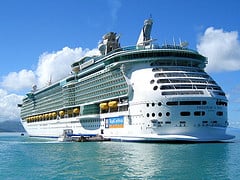 Clarridge seemed to enjoy his time on the ship, and tried a few different venues on the first night of their cruise. Here are some of his thoughts...
Clarridge seemed to enjoy his time on the ship, and tried a few different venues on the first night of their cruise. Here are some of his thoughts...
The Cruise Lines International Association, a lobbying group that represents cruise lines including Royal Caribbean, spent $529,134 in the second quarter lobbying federal officials on immigration, seaport inspections and other matters, according to a recent report.
If the number seems large, it's actually down from the first quarter, when the CLIA spent $696,000. This quarter's spending is also down from one year ago, when they spent $728,216 last year's second quarter.
The trade group, which represents cruise companies such as Royal Caribbean Cruises Ltd. and Carnival Corp., also lobbied the federal government on legislation related to vessel sanitation, crew and passenger health issues, vessel waste and port security, among other topics.
The CLIA also lobbied the Department ofHomeland Security, State Department, Customs and Border Patrol and the U.S. Coast Guard, among other agencies in the April through June period.